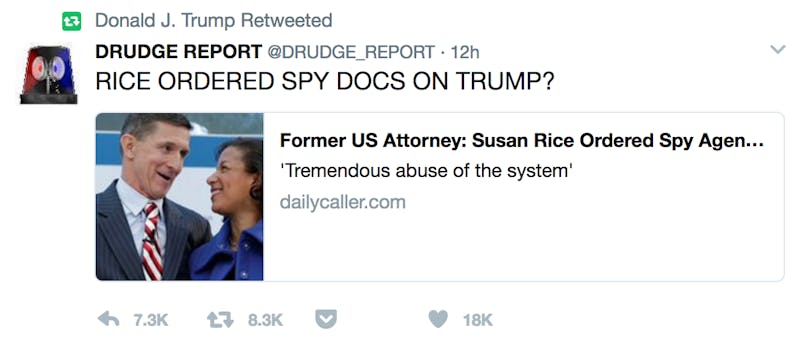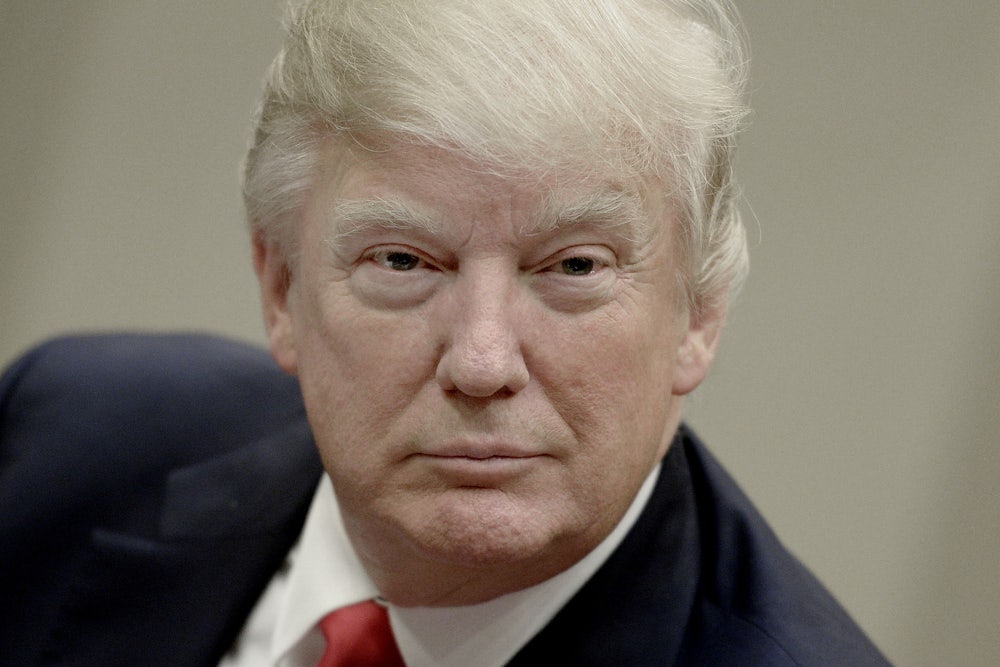The story of President Donald Trump’s infamous tweets falsely accusing President Barack Obama of having his “wires tapped,” and the steps Trump and his enablers have taken since to legitimate that claim, is a perfect microcosm of everything contemptuous and transgressive about this administration.
The president’s impulsiveness, his indifference to facts, his unwillingness to admit error, his White House’s hostility to truth, and the broader Republican Party’s cynical permissiveness of his antics—all of these tendencies were well known before Trump reached for his Android phone one month ago and started typing. What was less obvious, given the allegation’s unique synthesis of gravity and absurdity, was how to treat it as a news event. Every contested assertion a president makes must be run to ground, but in this case, the universal debunking—and the White House’s subsequent refusal to retract the claim—raised questions nearly as serious as the false scandal Trump had alleged.
Most to the point: How should reporters, knowing that the initial wiretapping accusation is meritless, treat Trump’s ensuing efforts to muddy the waters?
The Trump administration’s first two attempts so were so plainly ridiculous, they were met with appropriate skepticism. Reporters, backed by intelligence community leaders, discredited White House suggestions that Trump and his aides were direct targets of U.S. intelligence surveillance intercepts, or of British spying conducted on Obama’s behalf.
But now the administration has concocted a third justification that is far more insidious because it migrates from the realm of fantastical conspiracy theories to something more complex, facially plausible, and contiguous with Trump’s stated purpose: to shift public scrutiny away from his campaign’s complicity in Russian election interference, and toward his unsubstantiated counterclaim that the Russia story is fake and driven by illegal, selective, and politically motivated leaking of classified intelligence.
The real story turns out to be SURVEILLANCE and LEAKING! Find the leakers.
— Donald J. Trump (@realDonaldTrump) April 2, 2017
Unlike the initial cover stories, this one is working—and the consequence isn’t just distraction, but to establish a dangerous premise: that efforts to determine whether Americans collaborated with foreign intelligence agents to sabotage a U.S. presidential candidate are inherently partisan.
In a narrow sense, none of Trump’s diversions will matter because ultimately the entire controversy will resolve on the same point: Either the Trump campaign and Trump transition were up to no good, or they were not. If along the way it turns out Obama administration officials behaved improperly, it won’t have any bearing on that cardinal question.
The danger is that the administration will successfully poison the ultimate findings of FBI and congressional inquiries into election meddling. Those who treat this latest accusation as if it were grounded in good faith are abetting them in that goal.
White House aides with access to highly classified information, in concert with House Intelligence Committee chairman Devin Nunes, have spent two weeks telling reporters a new story: that Obama officials spied on Trump aides during the transition by unmasking their names in transcripts of legal foreign intelligence intercepts, and inappropriately disseminating that information throughout the government, for exclusively political purposes. The person at the center of this conspiracy, they now say, was Obama national security adviser Susan Rice. “The more we find out about this, the more we learn there was something there,” White House press secretary Sean Spicer claimed on Tuesday, without elaboration.

The Wall Street Journal editorial board opined Tuesday that Rice “would have had no obvious need to unmask Trump campaign officials other than political curiosity.” Bloomberg View columnist Eli Lake, who was the first to report that Rice had sought to unmask Trump officials, told MSNBC, “From my sources it appears this was pretty much rumor, valuable potential political information about the Trump transition plans for when they came into office.”
With conservative media fully bought in to the unmasking story, traditional outlets have felt obliged to treat Rice’s actions as presumptively suspicious, when intelligence experts say it was likely either routine, or, more damningly for Trump, of urgent national security relevance.
In absence of everything we know to be true—about the Trump campaign’s ties to Russia, the ongoing counterintelligence investigation of Trump associates and Russian interference in the election, disgraced former national security adviser Michael Flynn’s post-hoc registration as a foreign agent—this would be an explosive allegation. In full context, it simply sounds like a national security adviser doing her job under extraordinary circumstances.
But if senior intelligence officials can’t concern themselves with the national security implications of foreign meddling in an election, or of the sundry conflicts corrupt campaign officials (like, say, Trump’s) might bring into government, without subjecting themselves to character assassination, it creates horrifying incentives for both potential meddlers and their beneficiaries. The corollary of saying Rice’s only possible motives were nefarious—that what she and others did was shady on its face—is that campaigns should operate with impunity, free to woo foreign intelligence organizations as if they were no less central to the partisan fray than political action committees. After all, anybody who probes the question will be tarred as an unreliable narrator.
We should all support a full accounting of what the Russian government did, what the Trump inner circle did, and how the U.S. government responded. But Trump and his aides have been engaged in a well-documented campaign of deception since those fateful tweets on March 4. Placing the burden of proof on anyone other than them is an error we will all come to regret.
